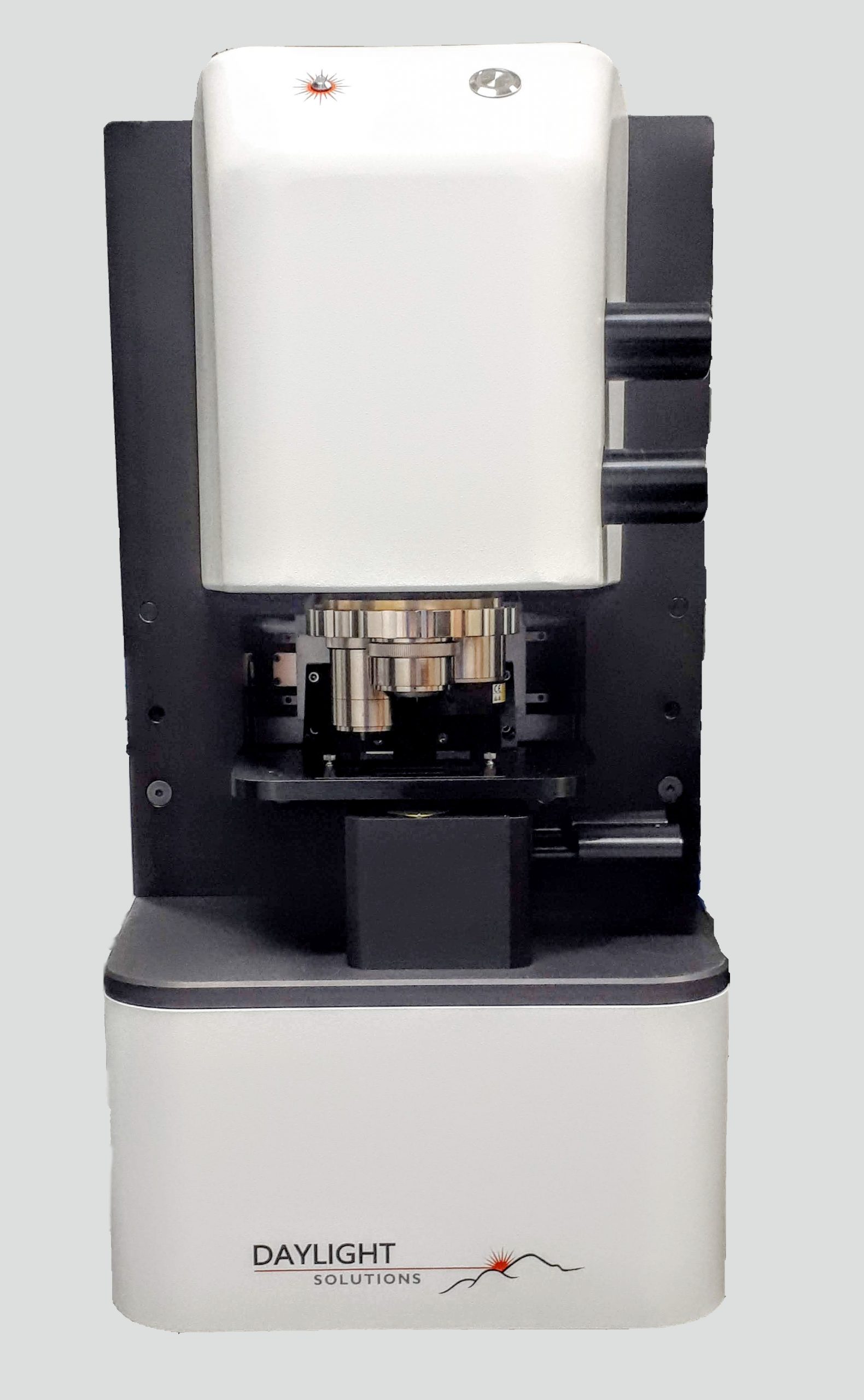
The Centre for Advanced Photonics and Process Analysis was delighted to expand its service offering with the addition of the new Quantum Cascade Laser (QCL), a MIRcat-QT™ Rapid-Scan, Ultra-Broadly Tunable Mid-Infrared (MIR) CW/Pulsed laser.
The main purpose of the set-up will be as a stepping-stone to provide affordable automated characterization solutions for companies to take back on-site. Characterizations are performed regularly on high-end expensive commercial equipment based at CAPPA. However, if the procedure is required regularly, returning to CAPPA routinely is not a realistic solution and as a result CAPPA often builds needs specific set-ups. The extremely flexible QCL laser offers MIR light covering the molecular fingerprint region, habitually used in determining the chemical composition of samples by identifying vibrational/rotational spectroscopic properties. The combination of the MIR source and detector will allow the construction of bench-top absorption, evanescent wave, optical coherence tomography and imaging, set-ups. Once needs-specific requirements are determined, economical equipment with more limited range can be acquired. CAPPA can then create an affordable in-line or at-line bespoke diagnostic. The combination will also allow an increase in sensitivity compared to commercial equipment by the construction of cavity enhanced absorption spectroscopy (CEAS) or intensity/frequency modulation set-ups. These purpose-built solutions can significantly increase sensitivity compared to other all-purpose commercial equipment.
Current availability of robust QCL lasers and MCT/MIR detector systems are limited and practises involving them are predominantly on permanent fixtures for fundamental studies. However, QCL lasers sources are a rapidly evolving market in both cost and variability. This equipment will enable performance on robust high-end equipment, to determine bespoke solutions on MIR products becoming increasingly affordable. The mobility of the QCL/MCT system offers the ability to go on-site at companies and find the applicability of selected techniques. Commercial equipment is typically built to take sample types usually of on the order of a few centimetres in size, a limitation which does not exist with the QCL and MCT combination. The adaptability of the QCL will specifically benefit companies where diagnostics are needed on specific portions of large or unorthodox shaped samples.
The QCL is the principle component of a new robust mid-Infrared (MIR) optical set-up, which also contains a super sensitive mercury cadmium telluride (MCT) scientific grade sensor. The QCL laser is tuneable over a broad spectral range, from 5.7-to 7.2 mm in the MIR, taking up a large component of the electromagnetic spectrum known as the molecular fingerprint region. The tuneable QCL has high-resolution (< 0.5 cm-1 in pulsed mode and <100 MHz in the continuous mode) and power of up to 100 mW. The MCT detector will be employed to cover the extensive opportunities supplied by the QCL laser, offering sensitivity of > 2500 V/W and a responsivity of faster than 3 ns. The MIRcat-QT™ Rapid-Scan, Ultra-Broadly Tunable Mid-IR CW/Pulsed laser system was purchased under the Enterprise Ireland Capital Equipment Funding Call.
The QCL laser system also has many academic capabilities. The output facet of the QCL is small enough that the light emitted can be imaged to a diffraction-limited spot, enabling the analysis of miniature targets, such as fibers or micro-defects, from long distances. The high power of the source also enables imaging of large areas, in both reflection and transmission modes, to study coatings, micro plastics or protein distribution. The sharp linewidth, of 150 MHz, allows application in trace, low concentration, gas sensing, using techniques such techniques as wavelength modulation and photoacoustic spectroscopy. These valuable tools make the QCL applicable in nearly every research field, from agriculture, environment, energy, astronomy, electronic, pharmaceutical, biology and health.
CAPPA is at the forefront of spectroscopy in Ireland and offers a wide range of spectroscopic services for both industrial applications and fundamental research. CAPPA has a wide variety of capabilities in spectroscopy applications. These include but are not limited to structural changes in materials, fluorescence detection, time- dependant change analysis, raw ingredient characterization, failure mechanism exploration, polymer analysis and hyperspectral imaging.
You can learn more about the spectroscopic capabilities at CAPPA here or more about our range of facilities here.


